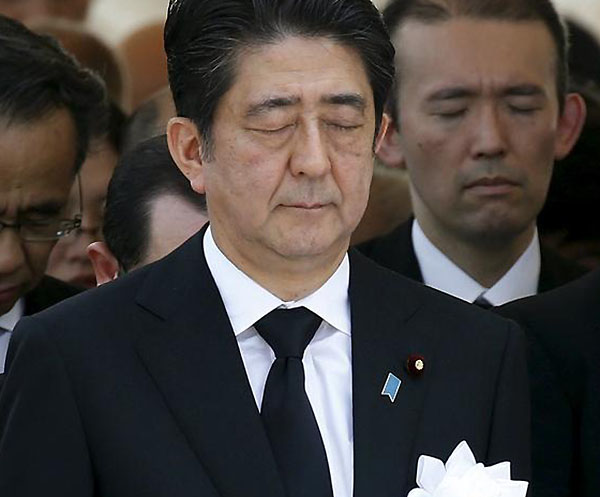Some reflection, but more needed
- By Liu Qiang
 0 Comment(s)
0 Comment(s) Print
Print E-mail China Daily, August 17, 2015
E-mail China Daily, August 17, 2015
|
|
|
Japan's Prime Minister Shinzo Abe offers a silent prayer for victims of the 1945 atomic bombing, during a ceremony commemorating the 70th anniversary of the bombing of the city at Nagasaki's Peace Park in western Japan, August 9, 2015. [Photo/Agencies] |
Japanese Prime Minister Shinzo Abe on Saturday, the day marking the 70th anniversary of Japan's surrender in World War II, sent a ritual offering to the notorious Yasukuni Shrine in Tokyo, which honors Japan's war dead, including 14 Class-A convicted criminals of WWII. This was just a day after his long-awaited statement to mark the anniversary.
True, Abe did include "deep repentance", "heartfelt apology", "colonial rule", and "aggression" in his 4,000-word statement - much longer than those on the 50th and 60th anniversaries - but he stopped short of offering a direct apology of his own for Japan's wartime atrocities.
In response, China's Foreign Ministry spokesperson Hua Chunying on Friday called on Japan to recognize and reflect on its history of aggression through concrete actions and to follow the path of peaceful development to win the trust of its Asian neighbors and the international community. Park Geun-hye, president of the Republic of Korea, said that Abe's speech contained "regrettable elements".
Given Abe's previous ambiguous artifices when it comes to Japan's war crimes and the role of the Yasukuni Shrine, many have been watching closely to see whether the right-leaning Japanese leader would apologize for the tremendous sufferings that his country caused to the world especially the Asian community. Just two days prior to Abe's statement, the UN Secretary General Ban Ki-moon called on Japan to reflect on its war history in order to move forward.
Unlike then Japanese prime minister Tomiichi Murayama, who expressed in his landmark 1995 statement, his own "deep remorse" and "heartfelt apology", Abe instead used "Japan" in his speech, he further elaborated on his false historical perspective by saying, "we must not let our children, grandchildren, and even further generations to come, who have nothing to do with that war, be predestined to apologize".
The incumbent Japanese leader's lip service to Murayama's heartfelt apology, which avoided mentioning what Japan should do for the time being, reveals his reluctance to apologize even when under great pressure to do so.







Go to Forum >>0 Comment(s)